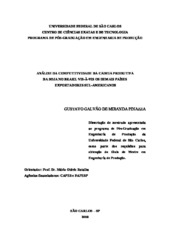Análise da competitividade da cadeia produtiva da soja no Brasil vis-à-vis os demais países exportadores sul-americanos
Abstract
The investigation of potentially and factors related to efficiency and
competitiveness of agricultural activities is presented in a great number of scientific
works. On the other and, fewer papers have investigated the activities with a
comparison of agrisystems´ competitiveness between different countries. With this
consideration and seeking to contribute to the development of the Brazilian´s
agribusiness, it was proposed as the main objective of this work the evaluation of the
soybeans´ agrisystem competitiveness in Brazil, in face of the others producers
countries in south America, focusing the opportunities of new destines of exportation of
the product. For this purpose, the methodological approach used in this study
considered the drivers of competitiveness as factors that can affect the performance of
the agrisystem, formed by considerable informations about domestic market,
international market, specific politics and programs, taxation, food safety, technology,
market structure, companies management, production resources and storage. From a
comparative analysis of this drivers between Brazil, Argentina, Paraguai, Bolivia and
Uruguai, and the application of the SWOT Analysis tool, the research reveals that in
front of new commercial trades among Mercosur and Europe Union, Brazil is one of the
countries that more incline to be improved, considering that the country is already
occupies a great position in the international market of soybeans products. However,
many progresses can possibility be reached, since problems like diseases and
sustainability questions reduce the productivity and efficiency. The same happens with
questions related to transportation and storage, in witch the producers´ areas are located
in long distances of the drainage ports, constituting the main impediment of the
competitiveness of the agrisystem in the country. Finally, the study suggests a row of
forms of intervention that focuses the improvement of the strengths and minimization of
the weaknesses, whose can be executed by producers and industries, government, or the
role group associated.
